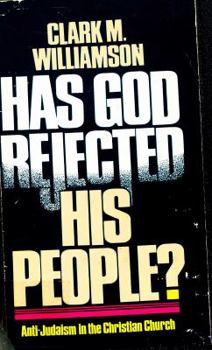Has God Rejected His People?: Anti-Judaism in the Christian Church
Select Format
Select Condition 
Book Overview
The point of this book is simple: to make Christians aware of a story that they have not been told--the story of relations between Christians and Jews. This involves tracing the church's anti-Judaism... This description may be from another edition of this product.
Format:Hardcover
Language:English
ISBN:0687166497
ISBN13:9780687166497
Release Date:January 1982
Publisher:Abingdon Press
Length:190 Pages
Weight:3.15 lbs.
Customer Reviews
1 rating
The covenant is still secure...
Published by Thriftbooks.com User , 20 years ago
Clark Williamson, professor emeritus of systematic and philosophical theology, has spent a great deal of his career in an effort to strengthen Jewish-Christian dialogue, and in particular, examining and working to correct subtle and blatant anti-Judaism and anti-Semitism in the Christian church. Unlike other minority groups (people of colour, women, etc.) who might be found among the members of a church's congregation, it is unlikely the Jewish people will be found regularly in Christian congregations, hence their voices are unlikely to be heard from within the community.Anti-Judaism and anti-Semitism are related but not precisely the same phenomenon. In this book, Williamson looks at the history of the relationship between Judaism and Christianity, with a special emphasis on the strains of anti-Judaism that have been present in Christianity since the first century of the Common Era. Beginning with a look at the historical Jesus, Williamson claims that the principle of dissimilarity does a disservice to both Christianity and Judaism. There is a tendency in biblical scholarship to position Jesus over against the Judaism of his time, particularly Pharisaic Judaism, concentrating on those features and attributes of Jesus most different from Judaism, and virtually ignoring the things that are the same. Jesus was a rabbi, proclaimed such before and after the resurrection, according to the biblical witness -- why not treat him as such?Williamson proceeds to examine the crucifixion, the witness of Paul, and the growing division between the followers of Jesus (many of whom were Jewish) and developing rabbinic Judaism in the aftermath of the destruction of the Temple, and later Jerusalem. The fact that the gospels were written for an audience that included Jews was lost in later centuries; Paul's struggle to keep the traditions together failed due to a backwards reading of his theology. Williamson traces the longer history of anti-Judaism in the church in his chapter 'From Barnabas to Barth'. Looking at the work of many influential figures, such as Irenaeus, Tertullian, John Chrysostom, leading up to the Reformation, and then later, to figures such as Bonhoeffer and Barth. Williamson is sensitive to Bonhoeffer's status as a martyr against Hitler, but makes the somewhat surprising statement that both Hitler and Bonhoeffer ultimately sought a world without Jews -- only Bonhoeffer's wish would be to convert the Jews to Christianity, a very different project than the Holocaust, but underpinned by the same kind of anti-Jewish strand that made events such as the Holocaust possible. In addition to the theological development of anti-Judaism, there was the canonical/administrative development of anti-Judaism, whose history Williamson also recounts. The final section of this text begins Williamson's project, to be continued in his later works, of a post-Holocaust theology that recognises the contribution of Judaism to Christianity, and seeks to find a b





